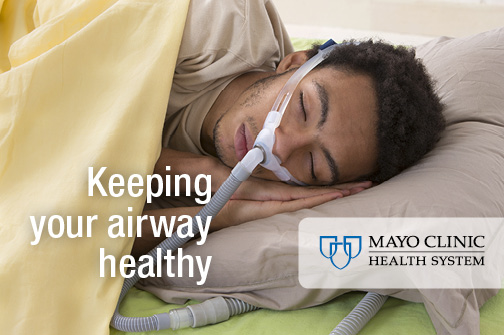6 tips for living with COPD

Chronic obstructive pulmonary disease, or COPD, is a leading cause of disability and death in the U.S., according to the American Lung Association. More than 12.5 million people in the U.S. have a diagnosis of COPD, but millions more may have the disease without knowing it.
COPD is a chronic inflammatory lung disease most often caused by long-term smoking, especially cigarettes. Another cause of COPD is breathing in toxic fumes or gases. In rare cases, the cause is a genetic problem.
People with COPD are at increased risk of developing respiratory infections, heart disease, lung cancer, pulmonary hypertension and depression. Also, people with chronic lung disease like COPD may be at greater risk of severe illness and complications from COVID-19.
Factors that can increase the risk of COPD include exposure to tobacco smoke, including secondhand smoke; asthma; occupational exposure to dust and chemicals; exposure to fumes from burning fuel; infections; and genetics.
According to the American Lung Association, more women are living with COPD than men, and deaths from COPD are higher in women than in men.
Symptoms of COPD
Symptoms of COPD often don't appear until significant lung damage has occurred, and they usually worsen over time, particularly if cigarette smoke exposure continues.
Signs and symptoms of COPD can include:
- Chest tightness
- Chronic cough that may produce clear, white, yellow or green mucus
- Frequent respiratory infections
- Lack of energy
- Unintended weight loss
- Shortness of breath
- Swelling in the ankles, feet or legs
- Wheezing
Treatment for COPD
If you have COPD and you smoke, it's vital that you quit. Most cases of COPD in the U.S. are directly related to long-term cigarette smoking. Stopping smoking can prevent COPD from worsening and reducing your ability to breathe.
Many people with COPD have mild forms of the disease and need little treatment other than quitting smoking. With advanced stages of the disease, effective treatment is available that can control symptoms, slow progression, reduce your risk of complications and exacerbations, and improve your ability to lead an active life.
Treatment for COPD can include medications, such as inhalers; oxygen; pulmonary rehabilitation; in-home noninvasive ventilation therapy; managing flare-ups, also called exacerbations; endobronchial valves; and surgery.
Coping with COPD
Living with COPD can be a challenge, especially as it becomes harder to catch your breath. You may have to give up some activities you previously enjoyed. Your family and friends also may have difficulty adjusting to some of the changes.
These strategies can help people with COPD feel better and slow the damage to their lungs:
- Avoid smoke and air pollution.
Besides quitting smoking, avoiding places where others smoke is essential. Secondhand smoke may contribute to further lung damage. Other types of air pollution also can irritate your lungs, so check daily air quality forecasts before going out. - Clear your airways.
With COPD, mucus tends to collect in air passages and can be difficult to clear. Controlled coughing, drinking adequate amounts of water and using a humidifier may help. - Eat healthy foods.
A healthy diet can help you maintain your strength. If you're underweight, your healthcare professional may recommend nutritional supplements. If you're overweight, losing weight can significantly help your breathing, especially during exertion. - Exercise regularly.
Exercising when you have trouble breathing may seem challenging, but regular exercise can improve your overall strength and endurance and strengthen your respiratory muscles. Talk to your healthcare team about pulmonary rehabilitation exercise programs. - Learn breathing techniques.
Talk to your primary healthcare professional or respiratory therapist about techniques for breathing more efficiently throughout the day. Also, be sure to discuss breathing positions, energy conservation and relaxation techniques you can use when you're short of breath. - See your healthcare team regularly.
Stick to your appointment schedule, even if you're feeling fine. It's essential to regularly monitor your lung function and tell your healthcare team if you have worsening symptoms or notice signs of infection. Be sure to get your annual flu shot and COVID-19 vaccine to help prevent infections that can worsen your COPD, and ask your healthcare team when you need the pneumococcal vaccine.
It can help to share your fears and feelings with your family, friends and healthcare team. You also may want to consider joining a support group for people with COPD, and you may benefit from counseling or medication if you feel depressed or overwhelmed.
One way to connect with others living with COPD is the COPD Support Group on Mayo Clinic Connect, an online patient community moderated by Mayo Clinic.
Mais Abdou, M.D., is a pulmonologist in La Crosse, Wisconsin.



